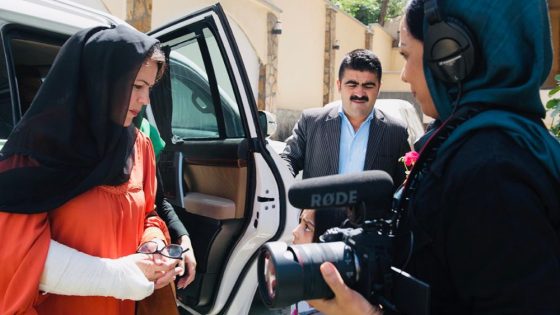Eminent Afghanistan filmmaker Roya Sadat had quite the journey while filming “The Sharp Edge of Peace,” which has its world premiere at Hot Docs.
The film follows four women leaders, Fatima Gailani, Fawzia Koofi, Habiba Sarabi and Sharifa Zumati, who risk their lives and receive death threats, as they find a way to sit at the negotiating table with the Taliban to ensure justice for women.
Sadat, whose “A Letter to the President” was Afghanistan’s contender in Oscar’s international category in 2017, was a teenage schoolgirl when the Taliban returned to power for the first time this century, a period she describes as a “terrifying nightmare of five dark and hopeless years.”
“The women of Afghanistan have an unwritten history of struggle. There’s no mention of their names in the pages of political history; this lost history has been standing up for its rights for years. And this time, the presence of four women at the negotiating table with the Taliban was astonishing to me,” Sadat said. “I saw making this film more than just an artistic endeavor; it was a responsibility. And I know the world needs narratives like this. The world of male-dominated politics astonishes us every day.”
The filming process for “The Sharp Edge of Peace” began in 2020, when Kabul was a dangerous place ahead of the U.S. troops’ withdrawal and the impending return of the Taliban. Access to government and civil institutions was often restricted or impossible. The presence of the four women protagonists at the negotiation panel heightened their security risks, and filming them presented numerous obstacles. Securing permits and coordinating with the negotiation team brought weeks of uncertainty. And alongside producer Leslie Thomas (“The Prosecutors”), Sadat and her team reached out to international bodies for assistance, seeking help from government contacts to assert their rights as independent filmmakers.
In 2021, Kabul fell to the Taliban and Sadat, Aziz Deldar, DoP and co-producer of the documentary, who is also her husband, and the film’s characters were exiled. “We were following the characters of the film in exile in America without travel documents and technical and financial resources was a big challenge,” Sadat said. “Simultaneously with the continuation of these women’s stories, our attention was drawn to the resistance of women on the streets of Kabul, which has become a turning point in the history of women’s struggles and has illuminated the ambiguous path of peace talks.”
The film was finally completed against the odds. “This film would not have been made if Leslie Thomas, the producer of the film, and Aziz Deldar my life companion and the brave team who stood together at the height of Kabul’s insecurity, were not in this challenging journey,” Sadat said.
However, there is no chance for “The Sharp Edge of Peace” to be exhibited in Afghanistan for the foreseeable future. “The Taliban is in control in Afghanistan and they have deprived women of their most basic rights. If gender apartheid were officially recognized in the world, gender apartheid would be taking place in Afghanistan, and in this situation, how could a film that talks about women’s resistance be allowed to be shown there? Our film, like ourselves, is in exile, and I am sure that one day it will be screened in Kabul’s Ariana Cinema, as well as in Herat, Kabul and Kandahar, when our homeland is free again,” Sadat said.
Source Agencies



